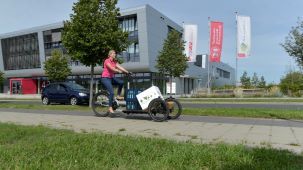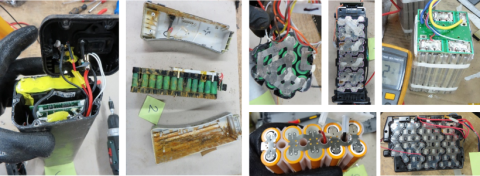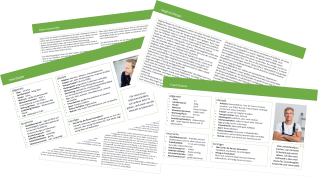E-bikes and e-cargobikes are already an integral part of our mobility. The strong spread of electrically assisted bikes is accompanied by the question of resourceefficient recycling after initial use. In the joint project “LifeCyling²”, solutions for further use and recycling of complete wheels and individual components are being developed and tested. This also includes the development of services and recycling measures.

Resource-efficient mobility
The volume of traffic for individual mobility and transportation of goods is increasing worldwide. E-bikes and e-cargobikes are suitable for lower-emission mobility, especially in innercity areas. However, the lower use of resources during the use phase of e-bikes and e-cargobikes is currently countered by a lack of solutions for the continued use of resource-intensive components such as batteries and the recycling of the complete bicycle.
Since e-bikes and e-cargobikes will be considered electronic scrap in the future, concepts must be developed to recycle individual components in a targeted manner or to transfer them to secondary uses. In order to increase the resource efficiency of e-cargobikes beyond their first use, the partners in the joint project “LifeCyling²” are researching and testing solutions for the targeted further use and upgrading of products and components and for material recycling. Effectiveness and innovations will
result from interdisciplinary cooperation and the strong linking of services and products.

Controlling life cycle options
The project LifeCyling² aims at improving the life cyclespanning resource efficiency against the background of the increasing spread of e-cargobikes. Technical concepts are to be developed to extend the service life by means of product updates and upgrades and to optimise the intensity of use through sharing solutions. In addition, measures for the life cycle-oriented design of e-cargobikes and methods for the definition of life cycle strategies will be developed and organizational measures for the targeted recycling of electronic components will be investigated. The design concepts developed for hardware and software systems will be implemented and tested in practice in the form of demonstrators for pilot projects. In addition, technical solutions and services will be developed and tested as software-based services to improve usage behaviour and resource efficiency during initial use by means of upgrades to enable resource-efficient reuse of the entire bike or individual components. In LifeCycling², four fields have been identified:
• Product: upgrading, residual value assessment and secondary use of e-cargobikes.
• Components: Recycling and conversion of accumulators and drive components.
• Material: separation and recycling of materials.
• Information and control: Collection and provision of information to increase the Resource efficiency.

Results (Status June 2022)
Based on the previously derived scenarios for E-Cargos, a wide variety of concepts for increasing the e-cargos’ resource efficiency have already been developed within the fields of product, components - and in particular the battery - applications, business models, and circulation.
The product structure of e-cargos has been analyzed to reveal functional or structural dependencies between individual modules and to discover potentials concerning heterogeneous life cycles and options. Findings from these analyzes were used to select suitable design measures such as material selection, joining and dismantling processes for the e-cargo. Following, processes for circulating and criteria for deciding on circulation paths were developed.
An app (currently available as a prototype) supports users in the use of e-cargos. For example, intensive use (and replacement of car trips) are rewarded by a reward system. In addition, the sharing of e-cargoes is enabled by the app. The app’s expansion in the direction of other forms of transport or other objects to share (e.g. tools) is conceivable. The project is also researching new business models on a larger scale. Business model canvases have been developed for rental, sharing, and leasing, and these models are examined in detail with regard to their market potential and competition. Neighboring systems, such as battery charging, have been mapped in a first concept for a charging cabinet. Here, too, it is about the possibility of being mobile by “using instead of buying”.
Solutions in pilot projects
The approaches are being developed in an interdisciplinary way in a network of two university institutes and four industrial partners and tested in pilot projects. From the pilot projects and findings, generally valid recommendations for action, strategies and technical measures as well as processes for the development and implementation of product, component and material cycles for e-bikes and e-cargobikes will be derived. Researchers from product and software development and accompanying social research are involved in the joint project. The industrial partners contribute expertise in the fields of recycling, safety of accumulators, leasing and service solutions for e-bikes and e-cargobikes as well as data acquisition, evaluation and visualisation.
During the project, associations, citizens, bicycle manufacturers and mobility providers will be involved in the collection of requirements and evaluation of future application scenarios for e-cargobikes.
Publikationen
Cudok A., Lawrenz, S., Rausch, A., Vietor, T.: Circular Economy Driven Communities – Sustainable Behavior Driven by Mobile Applications, In: Procedia CIRP, Volume 105, 2022, Pages 362-367, ISSN 2212-8271, https://doi.org/10.1016/j.procir.2022.02.060.
Cudok, A., Neugebauer, L., Vietor, T.: Increasing Acceptance for Refurbished Products at the Example of E-Cargo Bikes, In: Procedia CIRP, Volume 105, 2022, Pages 571-576, ISSN 2212-8271, https://doi.org/10.1016/j.procir.2022.02.095.
Krasteva, P., Cudok, A., Raulf, C., Huth, T., Vietor, T., Joachim, A. (2021). Vision Board. Zeitschrift für Zukunftsforschung, 1, (urn:nbn:de:0009-32-54552)
Project flyer of the funding measure (German / English) (March 2021)
The project flyers offer an insight into the contents and goals of the ReziProK projects and present first results in each case.
Project sheets of the funding measure (German) (August 2019)
The project sheets provide a brief overview of the individual projects and their goals.
Contributions to the ReziProK Transfer Conference in June 2022
Poster (German) (June 2022)
Presentation (German) (June 2022)
Picture credits: NFF/Massel; TU Braunschweig/Cudok
